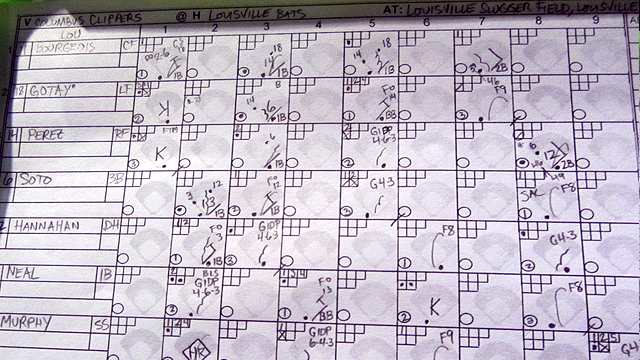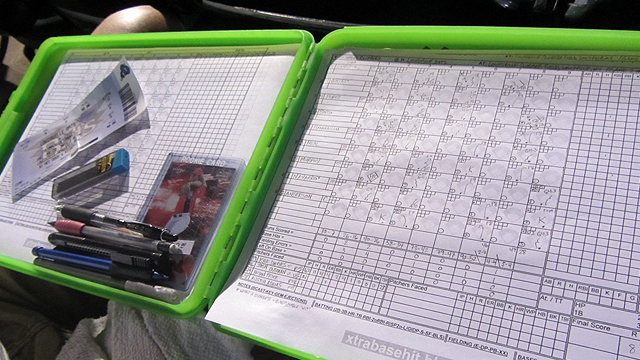Scorekeeping becomes a passion for Bats fan
A minute to learn,... a lifetime to master.
That elliptical phrase has long been used as the tagline for the board game "Othello," but it could also be applied to the time-honored art of baseball scorekeeping. Any fan with a rudimentary knowledge of baseball can quickly understand the basics: each position on the field has a corresponding number, and every play of the ballgame is recorded using these numerical notations.
But within this simple system lurks infinite complexity. Those who diligently keep score at ballgames often do so because it helps reveal the nuance and depth to be found in each and every contest. And within this standardized format, scorekeepers can adopt their own systems and notations in order to create a highly personalized document of each game that they have witnessed. In this regard, scorekeeping is the free jazz of sports documentation. Once the rules are understood, mastered and internalized, its practitioners can veer into strange and deeply esoteric directions.
While attending July 22's game between the Louisville Bats and the visiting Columbus Clippers, I spent several innings with a devoted scorekeeping fan who prefers to only be identified as "Stevo." A Louisville resident and self-described "semi-retired punk-metal atavist," Stevo can often be seen practicing his scorekeeping craft at Louisville Slugger Field (he also writes about scorekeeping on his blog, "The Baseball Enthusiast").

The view from Stevo's seats at Louisville Slugger Field, the home of the Reds' Triple-A affiliate. (Ben Hill/MiLB.com)
|
What follows is an excerpt from our conversation, in which Stevo expounds on the myriad joys and endless evolution of his scorekeeping process. Hopefully, his passion for this rewarding and defiantly analog hobby will inspire others to pursue it.
MiLB.com: When did you start keeping score at games, and why?
Stevo: I really fell away from baseball as an adult, except peeking through the shower curtains at the '91 World Series and stuff like that. And then in the early 2000s I started coming back to baseball. I realized that as a kid, even though I was a fan, I didn't really understand the game. … As an adult I started to want to know more about what was happening in the game, and the game within the game and the game within that. I could tell that there were a lot of layers, but I was having trouble understanding what those layers were.
I picked up [Paul Dickson's book] The Joy of Keeping Score and started looking through it. And I felt like if I did it just for fun, then I would start to unlock some of these mysteries. … I would start understanding some of the things I was learning rather than just learning them and accepting them as truth. … It's just like brewing beer, which I'd done for several years. I was a very good note-taker anyway, so I picked it up pretty quickly and started developing my strategy, if you will. It was just like those first couple batches of beer. They're kind of crazy, but you're always excited because, "Hey, I made beer."
Those first few score sheets, it was the same thing. They were a mess, but I could actually look at them a week, a month, a year later and I could still understand what was going on, and that was my key to understanding what was going on with the game. Also, as a spectator and not a participant, it was crucial to learn how to pay attention to the details. Because that really is discipline. A lot of stuff goes on, and [to paraphrase] Tony LaRussa, you have to try to pay attention to all of those details at once. To take all of that and put it into a historical record was an epiphany for me on so many different levels.

MiLB.com: Once you got the basics down, how did your scorekeeping process evolve and expand?
Stevo: Again I make the correlation with making beer, because my development was very similar in that process. With beer, you start at a basic level and then you want to try this and you want to try that. For example, "I want to culture my own yeast." "I want to dry hop." There are always all these other things to be done, and with scorekeeping it's the same way.
Immediately, right off the bat, I wanted to count the number of pitches. The first few games I kept score I didn't count the pitches, and I felt like I was missing something. Counting pitches, which were strikes, fouls, that kind of thing. I wanted to put that all together so that when I was done looking at my score sheet, the number of pitches that a pitcher had thrown matched what was in the box score. I wanted to be accurate and precise with how I was doing it. It took me a month or two of scoring a game two or three times a week to get that.
That was the first thing, and it made me feel like, "Now I can see everything." But after I did that for a while, I realized that there was something else I was missing. I wanted to keep track of the kind of outs. I wanted to keep track of the strikeouts, but also the fly outs and ground outs. Because that's a picture of a certain pitcher or a certain game -- a pitcher might be recording mostly fly outs or mostly strikeouts, and there's a difference. There's a nuance there.
And then I moved on to, "Well, I'm counting the pitches but now I want to count the pitches in order. I want to know which pitch was the first pitch of the at-bat, I want to know which pitch was the fifth, and keep track of it that way." So I started working on that, and then runners left on base and runners in scoring position. Those are the most recent developments in my scorekeeping technique.

MiLB.com: I noticed that your scorecards have a lot of individualized quirks. You track the trajectory of fly balls, and use obscure notations such as "FLS" and "BLS" (for "Flying Lousiville Slugger" or "Broken Louisville Slugger").
Stevo: Ever since the first score sheet I did as an adult, I thought that broken bats were kind of funny. … And living here in Louisville, they make the bats here, so I started writing 'BLS' for "Broken Louisville Slugger." And I now not only keep track of when they happen, but when I tabulate everything at the bottom, I like to keep track of the pitcher who broke the bat. That's something I would have missed before. And there are some pitchers who do that more often than not, even though breaking a bat is a true random event, mathematically. But there are some pitchers who always break a bat, at least once and even twice during an outing and you start to see those patterns.
MiLB.com: What are some of your favorite scorekeeping memories?
Stevo: One of the most interesting ones was a fourth of July game here [in Louisville] that went into extra innings, and Todd Frazier hit a walk-off fielder's choice RBI. And a year or two later I caught up with him at an event here. I took out the score sheet and said, "Todd, do you remember this?" And he looked at the score sheet -- "Oh, yeah!" Then I gave him a pen and he signed it for me. So that was really cool.
There have been a couple of games I can think of where the inning went on for so long that I had to go into the next [inning] column. It was such a mess and I just cherished it forever. Without even looking at the numbers, you can look at it and see a mess right there in the middle and remember. "Oh, something went totally off the rails there." You don't have to ask, you can tell that's when it happened and that's when things went south.
MiLB.com: So, to sum it all up, why should people keep score at baseball games?
Stevo: You get to keep track of the events of the game at your own level, and, most importantly, go back to those events at another point in time and relive the whole game in your mind. It's like hearing a song you first heard when you were driving around in your Pinto in high school. And you remember where you were and what you were wearing and who you were with in the car.
It's the same kind of thing. I think it evokes the nostalgia of baseball from a historical aspect, and at the same time it develops from a participant's point of view what they understand, at their own pace. And I think that would be my selling point. You could actually nurture your participation to the next level by engaging yourself in this way.
MiLB.com: Scorekeeping is a metaphor for life, it seems. The whole game can go by in a blur, yet one can find the infinite in the smallest detail.
Stevo: Precisely. Everyone talks about baseball being such a slow game, but so many things happen during those slow moments. A lot of people, even people who watch a lot of baseball games, tend to ignore those details and forget about them.
Benjamin Hill is a reporter for MiLB.com and writes Ben's Biz Blog. Follow Ben on Twitter @bensbiz.